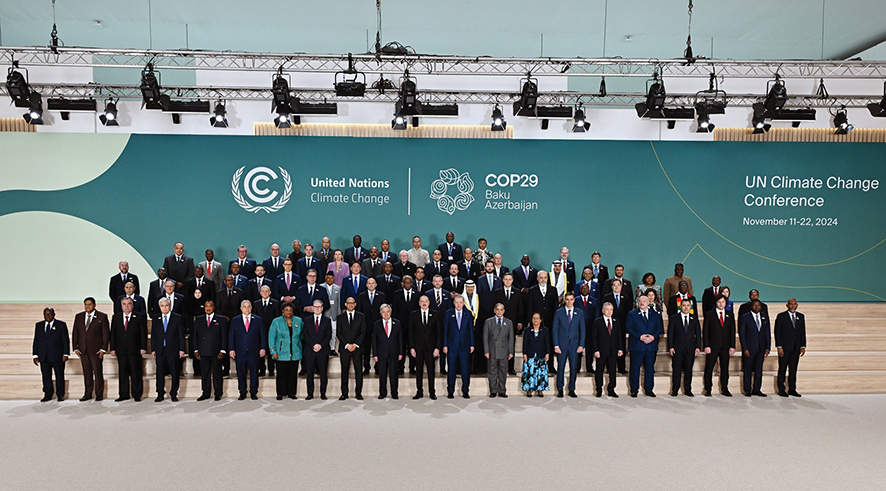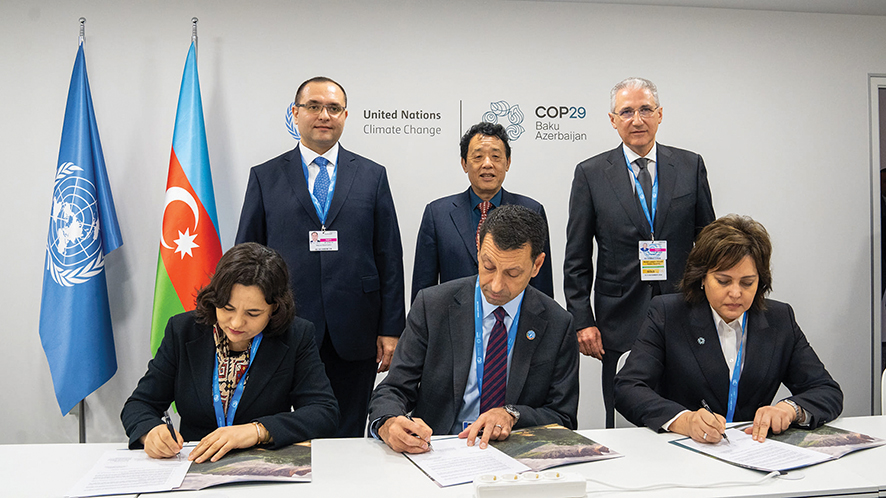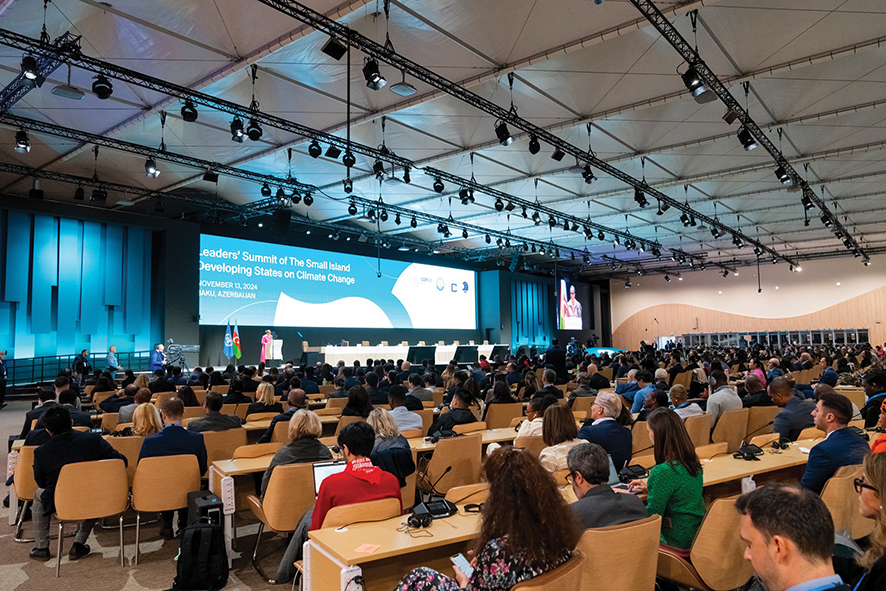As the world watches COP29 this week and next, the lessons and promises from COP28 still loom large, carrying with them both hope and skepticism. Last year, negotiators gathered in Dubai with ambitious goals: operationalizing the Loss and Damage Fund and tackling the urgent need to move away from fossil fuels. While there were some positive steps, the reality of the climate crisis, now more urgent than ever, shows just how far we still have to go. With extreme weather becoming more frequent and ever more devastating, we must ask: Are we on track to meet the challenges ahead? What barriers continue to prevent real progress, and how can we make sure that vulnerable communities are prioritized in the global fight against climate change? As we look back on COP28 and face the growing threat of a warming planet, COP29 presents a crucial moment to hold countries accountable and to find new, more effective ways to work together on climate solutions.

COP28: Achievements and Shortcomings
When COP28 kicked off, there was a clear benchmark for success: the implementation of the Loss and Damage Fund, agreed upon at COP27, and a firm commitment to phasing out fossil fuels. While both goals were technically met, they didn’t go far enough to deliver the meaningful change that many had hoped for. The Loss and Damage Fund will be available to all developing countries that are “particularly vulnerable” to climate change’s destructive impacts – though precisely who qualifies as the most climate-vulnerable has been up for debate. The fund was approved right away, though, with several countries making pledges, including $100 million from the UAE, $100 million from Germany, and $70 million from the UK.
The creation of the Loss and Damage Fund was a significant achievement, one that represents years of advocacy by leading countries and civil society groups pushing for climate justice. Two years ago, an agreement like this, especially with the UK leading contributions, seemed unimaginable. Indeed, it was a hard-won victory, and one that shows the power of relentless lobbying and international solidarity.
Yet, despite the fund’s creation, its structure and management raise serious concerns. The fund will be administered under the UNFCCC, but its secretariat will be hosted by the World Bank. This decision sparked natural controversy, given the Bank’s long history of financing fossil fuel projects, including over $15 billion invested in fossil fuels since the Paris Agreement. Critics worry that this fact will not only undermine the fund’s credibility, but will also hinder its ability to deliver real benefits to the communities most affected by climate change.
Perhaps the biggest disappointment from COP28 was the failure to decisively address the fossil fuel industry—the root cause of climate change. While last year’s conference did see some movement toward a global consensus on the need to phase out fossil fuels, the results were less than conclusive. COP28 was the first major conference where the global need to transition away from fossil fuels was widely recognized, but the question remains: how do we make this transition fair and equitable?
We saw little to no commitment from high-income countries—those most responsible for global emissions—to take real action. Several of these nations continue to ramp up fossil fuel production, leading many low- and middle-income countries to question how the transition will be financed and how their interests will be protected. Without clear, actionable commitments from wealthy nations to stop expanding fossil fuel extraction and to increase financial support for renewable energy transitions, adaptation, and the Loss and Damage Fund, it will be hard to expect meaningful progress.
COP29 will need to address these gaps, particularly when it comes to climate finance. One of the biggest tasks ahead is establishing a new, more ambitious collective finance goal to replace the previous $100 billion annual commitment—a crucial step to ensuring a fair and just transition for all.
 COP29 President Mukhtar Babayev with FAO Director-General Qu Dongyu to sign an agreement to launch the Baku Harmoniya Climate Initiative for Farmers. Source: FB
COP29 President Mukhtar Babayev with FAO Director-General Qu Dongyu to sign an agreement to launch the Baku Harmoniya Climate Initiative for Farmers. Source: FB
Azerbaijan: Host of COP29
Azerbaijan, the host of COP29, is clearly looking to strengthen its international standing while navigating a difficult political and economic landscape. With an economy historically dependent on fossil fuels, Azerbaijan is trying to balance its energy ambitions with the realities of climate change, all while managing a regime that has been criticized for its authoritarianism and poor human rights record. The country’s oil and gas sector remains its economic lifeline, but production is declining, and the government now faces the difficult task of diversifying its energy portfolio.
Despite some efforts to diversify into renewables, progress has been slow, and the government’s climate policies remain unimpressive. While Azerbaijan has signed various climate agreements, it has yet to show the commitment or follow-through needed to make a significant impact. The EU is its key trading partner, and Azerbaijan has become an important supplier of natural gas following on from Russia’s invasion of Ukraine. However, its future role in the global energy transition remains uncertain.
Azerbaijan views COP29 as a chance to attract investment in renewable energy and improve its global reputation. However, the country’s initial handling of the conference’s organizing committee, made up entirely of men, has raised red flags about its commitment to diversity and genuine representation.
What to Expect from COP29
With the above very much in mind, democratic countries and civil society groups are approaching this year’s climate conference with caution. While the event offers an opportunity to push for meaningful climate action, it also risks becoming a stage for greenwashing—where Azerbaijan, in particular, might use the global spotlight to promote its image while sidestepping substantive change. COP29 offers a chance to highlight critical environmental issues in Azerbaijan and the broader South Caucasus region, but it will be up to activists, journalists, and governments to ensure that the conference doesn’t become another exercise in rhetoric over results.

Key Issues for COP29
The ongoing conference is expected to be shaped by several critical issues:
• The Global Stocktake: A five-year review of global progress on the Paris Agreement. This will assess mitigation, adaptation, and climate finance efforts, and countries will be expected to revise their Nationally Determined Contributions (NDCs) based on this assessment.
• Fossil Fuel Phase-Out: There is growing pressure for countries to set definitive deadlines for phasing out fossil fuels, with an eye on the renewable energy targets that must replace them.
• Climate Finance: Rich nations must deliver on the $100 billion annual climate finance commitment they made to developing countries, while also working to establish a new finance goal post-2024.
• Loss and Damage Fund: COP29 will be a crucial moment to discuss how the fund will be operationalized, focusing on the contributions of wealthy nations and how the fund will be managed.
• Adaptation and Agriculture: We can expect calls for a global adaptation goal and stronger alignment of agricultural policies with climate targets, recognizing that food systems are a significant source of emissions.
The success of COP29 will be measured by how much progress is made on decarbonization, climate finance, and the operationalization of the Loss and Damage Fund. Countries, particularly the wealthier ones, will need to show that they are committed to real climate action and that they are willing to help finance the transition to a low-carbon future for all.
By Katie Ruth Davies
Related articles:
Protest Against COP29 in Baku: Greta Thunberg and Activists Rally in Tbilisi














